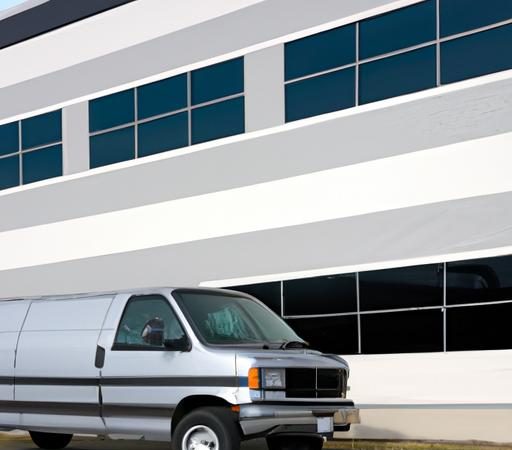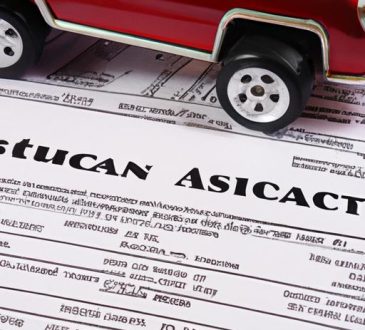
When it comes to running a cargo van business, ensuring you have the right insurance coverage is crucial. But what exactly are cargo van insurance requirements? In this article, we will delve into the definition, importance, and key aspects of cargo van insurance requirements. By the end, you’ll have a comprehensive understanding of what you need to protect your business and stay compliant.
A. Definition of Cargo Van Insurance Requirements
Cargo van insurance requirements refer to the specific coverage and minimum insurance limits that are mandated by law or necessary to safeguard your business. These requirements vary depending on your location and the nature of your cargo van operations. It’s important to note that cargo van insurance requirements are not a one-size-fits-all solution. They can differ from state to state, and it’s essential to be aware of the specific regulations that apply to your business.
B. Importance of Understanding Cargo Van Insurance Requirements
Understanding cargo van insurance requirements is crucial for several reasons. Firstly, it ensures legal compliance, protecting you from potential fines or penalties that may arise from not meeting the necessary insurance standards. Secondly, it safeguards your business by providing financial protection in the event of accidents, theft, or damage to your cargo van and its contents. Having the right insurance coverage can be a lifesaver when unexpected situations arise, allowing you to recover quickly without devastating financial consequences.
C. Overview of the Article’s Content
Throughout this article, we will explore various aspects of cargo van insurance requirements. We will begin by discussing the different types of coverage available and the factors that influence insurance rates. Then, we will delve into the minimum insurance requirements for cargo vans, highlighting state-specific regulations and liability coverage. Additionally, we will explore additional coverage options that can provide enhanced protection for your business.
Understanding cargo van insurance requirements is the first step towards ensuring the longevity and success of your business. So, let’s dive into the world of cargo van insurance and equip ourselves with the knowledge needed to make informed decisions. Stay tuned for the upcoming sections where we’ll explore the nitty-gritty details of cargo van insurance requirements and how they impact your business.
Understanding Cargo Van Insurance
A. Definition and Purpose of Cargo Van Insurance
Cargo van insurance is a specialized type of insurance coverage designed to protect businesses that rely on cargo vans for their operations. It provides financial protection against various risks and liabilities associated with owning and operating a cargo van.
The primary purpose of cargo van insurance is to safeguard your business from potential financial losses due to accidents, theft, damage to your cargo van, or injuries to third parties. By having the right insurance coverage in place, you can mitigate risks and ensure that your business remains resilient even in challenging situations.
B. Different Types of Cargo Van Insurance Coverage
When it comes to cargo van insurance, there are several types of coverage options available to suit the unique needs of your business. Here are some common types of cargo van insurance coverage:
-
Liability Insurance: This coverage protects you from legal liabilities and expenses arising from injuries or property damage caused by your cargo van. It typically includes bodily injury liability and property damage liability coverage.
-
Physical Damage Coverage: This coverage safeguards your cargo van against damages caused by accidents, collisions, vandalism, or natural disasters. It can be further divided into comprehensive coverage (protection against non-collision incidents) and collision coverage (protection against collision-related damages).
-
Cargo Coverage: If your business involves transporting valuable goods or merchandise, cargo coverage is essential. It provides protection for the cargo you carry in your van, covering losses due to theft, damage, or spoilage.
-
Uninsured/Underinsured Motorist Coverage: This coverage safeguards you and your cargo van against accidents caused by drivers who lack sufficient insurance coverage or are uninsured altogether.
C. Factors That Influence Cargo Van Insurance Rates
Several factors can influence the insurance rates for your cargo van. It’s important to understand these factors as they can impact the cost of your insurance premiums. Some key factors include:
-
Driving Record: Your driving history and any previous accidents or traffic violations can affect your insurance rates. A clean driving record demonstrates responsibility and can help you secure more affordable premiums.
-
Cargo Van Usage: The purpose and frequency of your cargo van usage play a role in determining your insurance rates. Whether you primarily use it for personal use, business use, or commercial purposes will affect your coverage needs and rates.
-
Location: Insurance rates can vary based on your geographical location. Factors such as crime rates, traffic congestion, and weather conditions in your area can impact your premiums.
-
Deductibles and Coverage Limits: The deductibles you choose and the coverage limits you set can influence your insurance rates. Higher deductibles may lead to lower premiums, but it’s important to find the right balance between affordability and adequate coverage.
Understanding these aspects of cargo van insurance will empower you to make informed decisions when selecting the right coverage for your business. In the upcoming sections, we will dive deeper into the specific insurance requirements for cargo vans, ensuring that you have a comprehensive understanding of the necessary coverage to protect your business effectively.
Minimum Insurance Requirements for Cargo Vans
As a cargo van business owner, it’s essential to understand the minimum insurance requirements that apply to your operations. Meeting these requirements not only ensures legal compliance but also provides the necessary protection for your business. In this section, we will explore state-specific minimum insurance requirements, liability insurance obligations, and additional coverage options to consider.
A. Overview of State-Specific Minimum Insurance Requirements
Each state has its own set of minimum insurance requirements for cargo vans. These requirements typically include liability coverage, which protects against bodily injury and property damage caused by your cargo van. It’s important to research and understand the specific regulations in your state to ensure you meet the minimum insurance requirements. Failure to comply with these requirements can result in fines, license suspension, or other legal consequences.
B. Liability Insurance Requirements for Cargo Vans
Liability insurance is a fundamental component of cargo van insurance requirements. It protects you financially in case you are held responsible for causing harm to others or damaging their property while operating your cargo van. Liability insurance generally includes two types of coverage: bodily injury liability and property damage liability. Bodily injury liability covers medical expenses, lost wages, and legal fees if someone is injured due to your cargo van. Property damage liability covers the cost of repairing or replacing damaged property.
The specific liability insurance limits for cargo vans vary by state. These limits represent the maximum amount your insurance provider will pay in the event of a covered claim. It’s crucial to evaluate your business’s needs and the potential risks involved to determine the appropriate liability insurance limits for your cargo van.
C. Additional Insurance Coverage Options
While meeting the minimum insurance requirements is essential, it’s worth considering additional coverage options to enhance your protection. Depending on your business’s needs, you may want to explore comprehensive coverage, collision coverage, uninsured/underinsured motorist coverage, or cargo insurance. Comprehensive coverage protects against non-collision incidents such as theft, vandalism, or natural disasters. Collision coverage covers damages resulting from collisions with other vehicles or objects. Uninsured/underinsured motorist coverage provides coverage if you’re involved in an accident with someone who doesn’t have insurance or has insufficient coverage. Cargo insurance protects the value of the goods you transport.
Understanding the minimum insurance requirements for cargo vans is vital, but it’s equally important to assess your specific business needs and consider additional coverage options that provide comprehensive protection. By tailoring your insurance policy to your business’s requirements, you can have peace of mind knowing you are adequately covered. In the next section, we will delve into the factors to consider when choosing cargo van insurance, helping you make informed decisions to protect your business effectively.
Factors to Consider when Choosing Cargo Van Insurance
When it comes to choosing the right cargo van insurance, several factors must be taken into consideration. By evaluating the specific needs of your cargo van business, understanding the value of your cargo van and its contents, and determining the appropriate coverage limits, you can ensure that you have the right insurance policy in place.
A. Evaluating the Specific Needs of Your Cargo Van Business
Every cargo van business is unique, and it’s important to assess your specific requirements when selecting insurance coverage. Consider the nature of your cargo, the distance you typically travel, and the frequency of your operations. Are you transporting valuable goods that require additional protection? Do you frequently cross state lines, necessitating coverage that extends beyond your local area? By evaluating these factors, you can determine the level of coverage you need to adequately protect your business.
B. Understanding the Value of Your Cargo Van and Its Contents
The value of your cargo van and the goods it transports play a significant role in determining the appropriate insurance coverage. Consider the cost of replacing or repairing your cargo van in the event of an accident or theft. Additionally, assess the value of the goods you carry. Are you transporting high-value items that require specialized coverage? Understanding the worth of your assets will help you select the right insurance policy that adequately protects your investment.
C. Determining the Appropriate Coverage Limits for Your Business
Determining the appropriate coverage limits is crucial to ensure that you’re adequately protected in case of an unfortunate event. Review your state’s minimum insurance requirements and evaluate whether they provide sufficient coverage for your needs. Additionally, assess your potential liability in case of an accident. Consider the potential costs of property damage, bodily injury, or legal fees that may arise. By determining the appropriate coverage limits, you can mitigate financial risks and protect your business from potential liabilities.
By carefully considering these factors, you can make an informed decision when choosing cargo van insurance. Remember, each business is unique, and it’s crucial to tailor your coverage to match your specific needs. In the next section, we will explore how to find the right insurance provider to meet your requirements. So, let’s continue our journey towards securing the best cargo van insurance coverage for your business.
Finding the Right Insurance Provider
When it comes to securing cargo van insurance, finding the right insurance provider is essential. With numerous options available, it’s crucial to conduct thorough research and evaluation to ensure you choose the best fit for your business. Here are some key steps to guide you in finding the right insurance provider.
A. Researching and Comparing Insurance Providers
The first step in finding the right insurance provider is conducting extensive research. Start by identifying reputable insurance companies that specialize in cargo van insurance. Look for providers with a strong track record, financial stability, and a solid reputation in the industry. Consider factors such as their experience, customer service, and claims handling process.
Next, compare the coverage options and policy features offered by different providers. Pay attention to the specific cargo van insurance requirements they cater to and ensure they align with your business needs. Look for any additional benefits or value-added services they may offer, such as roadside assistance or customized coverage options.
B. Evaluating Customer Reviews and Ratings
Customer reviews and ratings can provide valuable insights into an insurance provider’s performance and customer satisfaction. Look for reviews from other cargo van business owners or individuals who have experience with the provider. Pay attention to feedback regarding the claims process, responsiveness, and overall customer experience.
Additionally, check for ratings from reputable sources, such as industry associations or independent rating agencies. These ratings can give you an idea of the provider’s financial strength and stability, which is crucial in ensuring they can fulfill their obligations in the event of a claim.
C. Obtaining Quotes and Comparing Prices
Once you have narrowed down your options, reach out to the insurance providers for quotes. Provide them with accurate information about your cargo van, its usage, and the coverage requirements you need. Obtain quotes from multiple providers to compare prices and ensure you’re getting a competitive rate.
However, remember that price shouldn’t be the sole determining factor. Consider the coverage limits, deductibles, and any additional benefits offered by each provider. Strike a balance between affordability and comprehensive coverage to ensure your business is adequately protected.
By following these steps and conducting due diligence, you can find the right insurance provider that meets your cargo van insurance requirements and provides the necessary coverage for your business. Take the time to research and compare, as this decision can have a significant impact on the long-term success and protection of your cargo van operations.
Conclusion
In conclusion, understanding cargo van insurance requirements is imperative for the success and longevity of your cargo van business. By familiarizing yourself with the specific coverage needed and the minimum insurance limits mandated by law, you can ensure legal compliance and protect your business from potential financial risks.
Throughout this article, we have explored the definition of cargo van insurance requirements and highlighted their importance. We discussed the various types of coverage available, such as liability insurance, and shed light on additional coverage options that can provide enhanced protection for your cargo van and its contents.
When selecting cargo van insurance, it is essential to evaluate your business’s specific needs, considering factors such as the value of your cargo van and the contents it carries. By understanding your requirements and assessing the appropriate coverage limits, you can make informed decisions that align with your business goals and financial capabilities.
Finding the right insurance provider is another crucial step in securing adequate coverage. Take the time to research and compare insurance providers, considering customer reviews, ratings, and obtaining quotes to ensure you find the best fit for your business.
Remember, insurance.codepel.com is here to assist you in navigating the complexities of cargo van insurance requirements. Our team of experts can guide you in selecting the right coverage and ensuring your business is adequately protected.
Don’t let the uncertainties of the road hinder your cargo van business. Take action today and secure the insurance coverage that meets your cargo van insurance requirements. Safeguard your business, protect your investments, and drive towards a successful future.
Insurance.Codepel.com – Your Partner in Cargo Van Insurance



